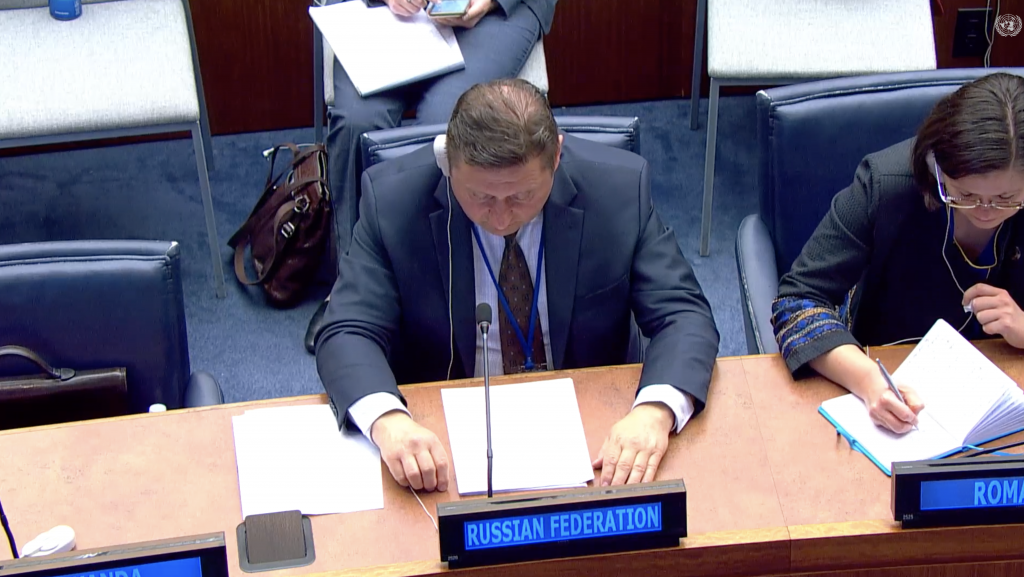Statement by Andrey Belousov, Deputy Head of the Delegation of the Russian Federation, at the Thematic Debate on “Regional Disarmament and Security” in the First Committee of the 78th Session of the UNGA
Mr. Chair,
Over the recent years, regional security worldwide has been put to a serious test. Tensions and war rhetoric are increasing; voices of the war party are gaining strength; while existing, long-standing regional conflicts are being rekindled new hotspots have emerged. Military alliances are further expanding, their activities growing more and more aggressive. The fundamental principle of indivisibility of security is flagrantly violated.
We would like to express our firm belief that getting the situation back under control and bringing it to normalcy are only possible based on the respect for universally recognized norms of international law, UN principles, Charter, purposes and objectives, by agreeing to denounce destabilizing military activities and ensure arms control.
We note that the worldwide trends reflecting the degradation in the field of military security continue to increase in Europe as well. Their underlying cause is the policy pursued by the US and its NATO allies, which is aimed at an outright confrontation with Russia and seeks to undermine the foundations of European security as well as destroy the existing time-proven comprehensive system of arms control and confidence-building measures.
NATO nations continue to build up their military capabilities along Russian borders and in their immediate proximity, enhance their operational capacities enabling them to deploy forces to the eastern flank. In order to respond to the imaginary, so-called, Russian threat, efforts are taken to increase the number and combat capabilities of multinational battalion tactical groups in the Baltic States and strengthen brigade units in Romania. Additionally, an armoured brigade and helicopter units of the US Armed Forces have been deployed to Europe. The overall period of presence of NATO navy ships in the Black Sea during one year has been extended.
There has been an increase in reconnaissance activities close to our see and air borders involving NATO partners' multi-purpose vessels, aircraft and drones. These activities are becoming increasingly provocative and dangerous. Special-purpose aircraft of NATO nations regularly violate the airspace of the Russian Federation over the Black Sea. The NATO air patrolling over the Baltic Sea has grown manifold. Forward coordination centres and new division command headquarters have been set up in East European states to allow for a speedy deployment and engagement of NATO forces.
The scale and intensity of NATO's military activity on the line of contact with our country have increased. At least 30 major military training and command and staff exercises have been held in the immediate vicinity of the Russian borders.
The aggressive policies of the United States and its allies in the post-Soviet space, as well as their persistent support of the neo-Nazi regime in Kiev, which, with an active external assistance, has been exterminating the population of Donbass for the ninth year running, forced us to resort to strongest measures. For a long time, we made every effort to seek a diplomatic solution to the conflict at the negotiations table, expecting the Western states to see reason. Yet they did their best to exacerbate the tensions and provoke a military operation.
Not only do the efforts of the United States and its allies to pump up Ukraine with more weapons and provide it with intelligence information protract the hostilities and lead to more casualties: in fact, they are pushing the situation to a dangerous point of direct military confrontation between Russia and the NATO states.
Any attempts to resume dialogue are doomed until the North-Atlantic Alliance renounces its East-oriented expansionist agenda and "deterrence" policy against Russia. We wish that our Western colleagues would finally heed the call of reason and stick to the principles of equality, mutual respect, consideration of legitimate concerns and needs in the field of military security.
Mr. Chair,
Russia has always assumed that the system of international agreements in the field of arms control, disarmament and non-proliferation is the most important element of the foundation of international security. However, this system has recently degraded considerably at the whim of Western countries.
For several decades, the US and its NATO allies have continued the process of destruction and dismantling of the major arrangements in the area of arms control and confidence-building, which they initiated themselves. In 2002, Washington unilaterally terminated the Soviet-US Anti-Ballistic Missile Treaty; in 2019, it withdrew from the Intermediate-Range Missile Forces Treaty, and in 2020, from the Open Skies Treaty. We had to respond by withdrawing from the Open Skies Treaty in 2021.
This process has been developing simultaneously with the crisis of conventional arms control mechanisms. This primarily refers to the Treaty on Conventional Forces in Europe (CFE). For more than 30 years following the dissolution of the Warsaw Treaty Organization and the USSR, we tried to find common ground here – unfortunately, to no avail. Our concerns and proposals have been ignored. Sweden and Finland's decision to join NATO has once and for all put an end to the system of limitations that have existed under the CFE. Overall, the recent developments have led to a dramatic military and political shift in Europe, bringing about extreme circumstances jeopardizing the supreme interests of our country. The Russian Federation therefore decided to denounce the Treaty.
Even this brief and sketchy, yet objective, overview clearly shows who is fully responsible for the deplorable security situation and further global military and political degradation.
Given the current lack of trust as well as the obviously hostile attitude on the part of Washington and the collective Brussels, it is unreasonable and naive to expect any progress towards revising the state of conventional arms control in Europe (CACE). Any dialogue on a new CACE version will only be possible if the West abandons its hostile anti-Russian policy. Shaping such a regime in future will undoubtedly require fundamentally new approaches while taking into account Russia's national interests as an imperative.
Thank you.
